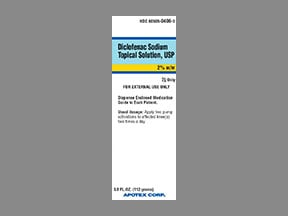
Pennsaid Coupons & Savings Card – Discount Prices from $53.64
Brand for: Diclofenac sodium
My prescription
Edit
112GM of 2%, Diclofenac Sodium (1 Bottle)
Select pharmacy

CVS
$67.89
COUPON PRICE
Walgreens
$53.64
COUPON PRICE
Albertsons
$65.18
COUPON PRICE
Walmart
$312.66
COUPON PRICEPennsaid savings card
Show this card to your pharmacist
Walgreens
$53.64
BIN
ID
PCN
GRP
015995
LHKPX276547
GDC
DR33
Powered by
Related NSAIDs prescriptions
More prescriptions for rheumatoid arthritis
Related NSAIDs prescriptions
More prescriptions for rheumatoid arthritis
Price history for Pennsaid (brand) & Diclofenac Sodium (generic)
1 Bottle, 112GM of 2%
Average retail price for Pennsaid
Average retail price for Diclofenac Sodium
Average SaveHealth price for Diclofenac Sodium
Our price history data is based on aggregated prescription data collected from participating pharmacies in America. Our prescription data updates daily to reflect the latest price changes. If you notice a missing data point, it means there wasn't sufficient data available to generate a monetary value for that date.
Over the last 12 months, the average discount price of Pennsaid is $1372.78 using the SaveHealth savings card. That's an average savings of 53.41% on Pennsaid with our discount card.
*Retail prices are based on pharmacy claims data, and may not be accurate when we don't have enough claims.
Pennsaid (Diclofenac Sodium) dosage forms
Dosage Quantity Price from Per unit 112GM of 2% 1 Bottle $65.18 $65.18 112GM of 2% 2 Bottles $115.36 $57.68 112GM of 2% 3 Bottles $165.53 $55.18 112GM of 2% 4 Bottles $215.71 $53.93
| Dosage | Quantity | Price from | Per unit |
|---|---|---|---|
| 112GM of 2% | 1 Bottle | $65.18 | $65.18 |
| 112GM of 2% | 2 Bottles | $115.36 | $57.68 |
| 112GM of 2% | 3 Bottles | $165.53 | $55.18 |
| 112GM of 2% | 4 Bottles | $215.71 | $53.93 |
What is Pennsaid ointment used for?
Pennsaid is a topical nonsteroidal anti-inflammatory drug (NSAID) used to treat pain associated with osteoarthritis, particularly in the knees. It helps reduce inflammation and alleviate pain in the affected area.
Is Pennsaid the same as Voltaren?
Pennsaid and Voltaren are not the same, but they are similar. Both contain the active ingredient diclofenac, which is a nonsteroidal anti-inflammatory drug (NSAID) used to relieve pain and reduce inflammation. However, they differ in their formulations and intended uses. Pennsaid is a topical solution specifically designed for application on the skin, often used for knee osteoarthritis. Voltaren, on the other hand, is available in various forms, including gels and oral tablets, and can be used for a broader range of conditions.
Can you get Pennsaid over the counter?
Pennsaid is a prescription medication and is not available over the counter. It requires a prescription from a healthcare provider.
Is Pennsaid only for knees?
Pennsaid is primarily indicated for the treatment of osteoarthritis pain in the knees. However, a healthcare provider may sometimes prescribe it for other joints if deemed appropriate. It is important for patients to follow their healthcare provider's instructions regarding its use.
Can Pennsaid be used on other joints?
Pennsaid is a topical nonsteroidal anti-inflammatory drug (NSAID) specifically approved for use on the knees to treat osteoarthritis pain. It is important to follow the prescribing physician's instructions and the product's labeling. If considering its use on other joints, it is advisable to consult with a healthcare professional to ensure safety and appropriateness.
